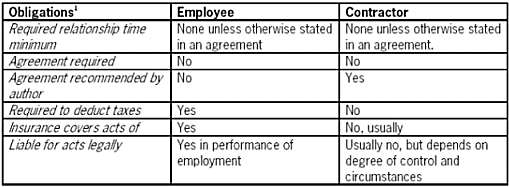Readers are cautioned not to rely on this article as legal advice as it is no substitution for a consultation with an attorney in your state. Based on jurisdiction and time, the law varies and changes.
Employees and contractors present a host of legal issues that can help or hurt an ecommerce business.
The Difference Between Employees and Contractors
To determine whether someone who’s hired by a business is a contractor or an employee, courts consider a variety of factors:
- If the work is done on the company premises
- Who provides the tools and resources to complete the work
- Who controls the work and work product
- Duration of the relationship
- Skill required
- Whether the hiring party has the right to assign additional projects
- The hired party’s discretion over how long and when they work
- The method of payment
- The hired party’s role in hiring and paying assistants
- Whether the work is part of the regular business of the hiring party
- Whether the hiring party is in business
- Whether or not benefits are provided
- The tax treatment of the hired party
A court will examine the facts and weigh each of the above to reach a conclusion. A legal agreement that sets forth the responsibilities of the parties involved can also help determine the result.
Approaches and Obligations: Employees vs. Contractors
The chart below outlines some of the differences in the ways your business should approach employees and contractors. You should note that:
- employment law is very state-specific,
- the information below can vary substantially for companies who handle projects for, and/or receive funding from, the government, and
- you should definitely consult with an attorney for advice on these matters in your jurisdiction.

Employees
Employee policies are used for "at-will" employment, and sometimes, to supplement employment agreements. At-will employment is very different from employment under an employment agreement, where you agree to hire the employee for a specified period, and he or she agrees to work for you for that period. Generally, employment agreements are not used for ordinary employees, because the hirer won’t want to be legally bound not to fire an employee or change the terms of his or her employment.
Employee Policies
Employee policies give notice and set uniform treatment and instruction for employees on their performance and behavior at the work place. Generally, it’s a good idea to have employees sign the end of the policy statement, or another document stating that they have received the information, and that they agree to it. It’s also important to present the information in the initial hiring session, to be sure that it is legally effective.
When you, or your attorney, write your policies, be sure they comply with the Federal and State law obligations your business is under, and that your business will actually stand by its obligations. These policies are essentially warranties to your employees that you may be held to — even though you don’t sign them.
Clauses for Your Policy
Your employment policy may contain the clauses on the following:
At-Will Employment Notice
The Policy should include a statement that notifies the employee that employment is "at will", which means that you may fire him or her, and he or she may quit at any time. The policy should also alert the employee that his or her duties, promotion or demotion, salary, relocation and all terms of employment are at your discretion.
Notice of Inappropriate Acts
The Policy should include a statement that instructs the employees on behavior that may get them fired. These acts usually include: criminal acts, being "high" on drugs or alcohol at work, and/or using the company resources and equipment, including email and the phone, for harassing, criminal, defaming, political, personal or sexual acts.
The Policy should include a statement that defines sexual, race, disability and religious harassment, how to report it, and how the company handles the reports. Given the high liability risk for sexual harassment claims, you definitely want to talk to an attorney in your state about such a policy.
Keeping Information Confidential
The Policy should include instructions on confidential information, including what information is considered "confidential", and how employees should treat such information.
Ownership of Work Product
The Policy should notify employees that you own their work product, and that it may not be used for other employers or their personal use. Particular language is required in order for these statements to be effective, so, again, you may want to consult an attorney here.
More Policy Provisions
Some policies also include the following:
Non-Solicitation
Some policies require employees not to solicit their coworkers to leave your business during and after their employment with you for a specified period of time. This can be important if you think, for example, that a group of employees might leave and start another business.
Non-Compete
Policies some times include non-compete clauses. Non-compete clauses are regulated in time and scope by state and case law. Overly broad clauses will be narrowed by a court to conform with the law.
You should be aware that employee agreements or policies that are too onerous will be rewritten or thrown out by courts. However, for the many employees who either do not know, or do not have the funds to hire an attorney, the policies may be an effective deterrent. On the flip side, consider that burdensome employee policies are a strong disincentive to potential employees, and your reputation in the community may suffer because of them.
Contractors
With contractors, you always want to have a written agreement.
A contractor agreement ensures that the contractor is aware of his or her obligations, that the parties agree on the services to be performed and the amounts to be paid, and that your business owns the work product. While companies may reasonably choose to operate without employee policies, failing to have a contractor agreement is extremely unwise because the contractor, by law, owns his or her own work product unless otherwise set forth in writing, as required by Copyright law.
Clauses for Your Agreement
Services
Clear definition of the services to be performed, and any deadlines for work product or performance is important. Failure to clearly define what is to be done can lead to each party, even in good faith, having different ideas and not discovering this until the work is completed and the company is not satisfied. The more detail you include about the services in the contract, the lower the risk of misunderstanding later. Also, remember that the services description in the contract is what legally defines the work product you are to receive. If the description is vague or lacks detail, you risk that legally you may not have any way to obtain more than what the contract states
Payment
The agreement should include a provision that states how much the company will pay the contractor, and the procedures for payment.
Relationship
It should be clear from the agreement that the relationship is not an employer/employee relationship, so that the contractor is aware that he or she will not receive employee benefits.
Inappropriate Acts
Your contractor agreement should contain the same types of restrictions on inappropriate acts and sexual harassment as discussed above.
Keeping Information Confidential
The agreement should include instructions on confidential information, including what information is considered "confidential", and how the contractor should treat such information.
Ownership of Work Product
The agreement should state that you own the contractor’s work product. This clause must be written in accordance with the language required under copyright law, otherwise the default is that each person owns what he or she creates.
Non-Solicitation
Most contractor agreements include a clause that restricts the contractor from soliciting your employees to work elsewhere.
Non-Compete
Some agreements include a provision for contractors not to work for the company’s competitors. This is generally regarded as somewhat burdensome, as contractors, by nature, must perform services for many parties typically in the same industry.
Representations and Warranties
You may want the agreement to include the following, or other, warranties:
- That the contractor will re-perform defective or non-conforming services for a time period indicated
- That the contractor is a US citizen or authorized to work in the US
- That the contractor will not infringe third party rights in performing services
- That the contractor is not violating any other agreement by performing services
Indemnification
Contractor agreements often also have a provision stating that the contractor will indemnify the company for any breaches of the warranties. Indemnification means that the contractor has to pay the company for any litigation costs resulting from his or her breach of the warranties.
Termination and Term
Finally, contractor agreements usually have a provision regarding how long the contractor will perform the services, and how the either party may end the relationship.
Conclusion
Properly drafted, contractor agreements and employee policies can reduce both risk and confusion in your business.
Readers are cautioned not to rely on this article as legal advice as it is no substitution for a consultation with an attorney in your state. Based on jurisdiction and time, the law varies and changes.
Judith is CEO and Founder of her virtual law practice, Coollawyer Legal Forms, which provides e-commerce forms and legal advice for Internet and technology companies. She served as in-house counsel at Adobe Systems and Sabre/Travelocity.com prior to starting Silver Law Inc. She holds a B.A. cum laude from Cornell University, her J.D. from University of California, Hastings College of the Law and is licensed in CA, FL and TX.




